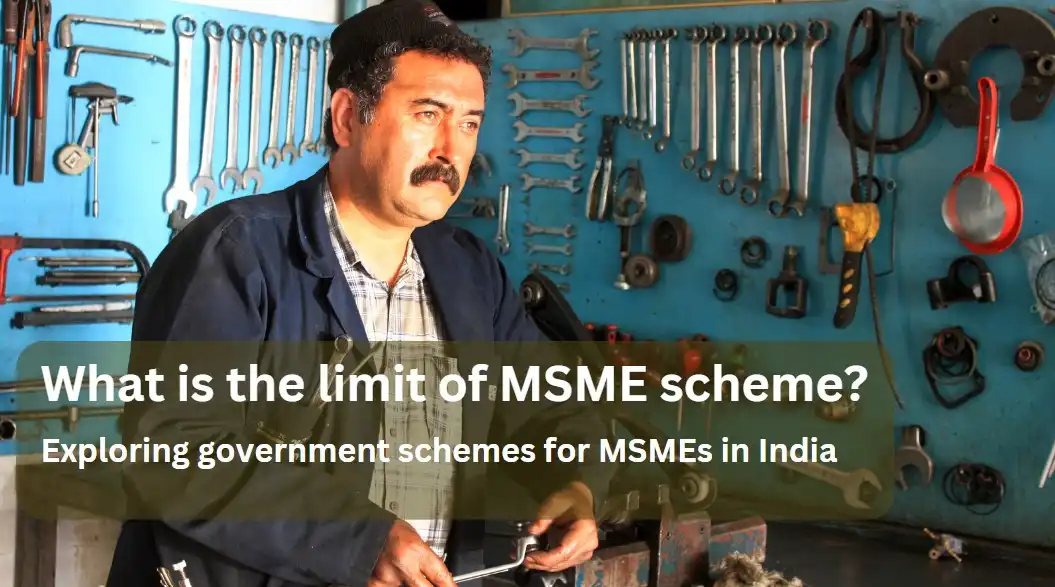Small and medium enterprises (SMEs) are the backbone of the Indian economy, contributing to around 45% of industrial output and employing millions of people. To support the growth and development of these enterprises, the government of India has introduced various schemes and policies for MSMEs (Micro, Small, and Medium Enterprises) at different stages of their business. One of the most frequently asked questions by MSMEs is, “What is the limit of MSME schemes?”In this article, we will explore the different government schemes for MSMEs in India and answer the frequently asked question, “What is the limit of MSME schemes?” Learn how you can benefit from these schemes to grow and develop your business.
Introduction
Starting a business is no easy feat, and MSMEs often face various challenges, including limited resources, lack of infrastructure, and tough competition. The government of India recognizes these challenges and has introduced several schemes and policies to support the growth and development of MSMEs. These schemes provide financial assistance, infrastructure development, marketing support, and technology up-gradation, among others. In this article, we will discuss the different government schemes for MSMEs in India and their limits.
What is the limit of MSME schemes?
Before we delve deeper into the various schemes, it is essential to understand the limits of MSME schemes. The government has set limits based on the investment in plant and machinery or equipment for manufacturing or service enterprises.For micro-enterprises, the investment limit is up to Rs. 1 crore ($136,000). Small enterprises can avail of schemes with an investment limit between Rs. 1 crore ($136,000) and Rs. 10 crores ($1.3 million), and medium enterprises between Rs. 10 crores ($1.3 million) and Rs. 50 crores ($6.8 million).These limits vary depending on the sector and the nature of the business. For example, in the case of IT companies, the investment limit for small enterprises is up to Rs. 10 crores ($1.3 million), and for medium enterprises, it is up to Rs. 50 crores ($6.8 million). Similarly, for manufacturing enterprises, the investment limit for small enterprises is up to Rs. 10 crores ($1.3 million), and for medium enterprises, it is up to Rs. 50 crores ($6.8 million).
Government Schemes for MSMEs
1. Prime Minister’s Employment Generation Programme (PMEGP)
The Prime Minister’s Employment Generation Programme is a credit-linked subsidy scheme aimed at generating employment opportunities by promoting self-employment through the establishment of micro-enterprises in the non-farm sector. The scheme provides financial assistance of up to 35% of the project cost in urban areas and 45% in rural areas, with a maximum limit of Rs. 25 lakhs ($34,000) per project.
2. Credit Guarantee Fund Trust for Micro and Small Enterprises (CGTMSE)
The Credit Guarantee Fund Trust for Micro and Small Enterprises scheme aims to provide collateral-free credit facilities to MSMEs. Under this scheme, banks and financial institutions provide credit facilities to MSMEs without collateral, and the trust provides a guarantee cover of up to 85% of the loan amount for credit facilities up to Rs. 2 crores ($273,000).
3. Technology Upgradation Fund Scheme (TUFS)
The Technology Upgradation Fund Scheme aims to support the technological upgradation of the MSMEs in the textile and jute industries. The scheme provides financial assistance of up to 15% of the project cost with a maximum limit of Rs. 30 lakhs ($41,000) for a single unit.
4. National Small Industries Corporation (NSIC)
The National Small Industries Corporation provides various services to MSMEs, including marketing support, technology support, and credit facilitation. The NSIC operates various schemes, such as the Single Point Registration Scheme, the Performance and Credit Rating Scheme, and the Raw Material Assistance Scheme, among others.
5. Credit Linked Capital Subsidy Scheme (CLCSS)
The Credit Linked Capital Subsidy Scheme aims to facilitate technology upgradation by providing capital subsidy to MSMEs. Under this scheme, a capital subsidy of 15% of the project cost is provided to eligible enterprises, with a maximum limit of Rs. 15 lakhs ($20,000).
6. Micro and Small Enterprises Cluster Development Programme (MSE-CDP)
The Micro and Small Enterprises Cluster Development Programme aims to enhance the competitiveness of MSMEs by providing support for infrastructure development, technology upgradation, and marketing. The scheme provides financial assistance of up to 70% of the project cost with a maximum limit of Rs. 10 crores ($1.3 million) per cluster.
FAQs on What is the limit of MSME schemes
Can MSMEs avail of more than one government scheme?
Yes, MSMEs can avail of multiple government schemes, subject to eligibility criteria and compliance with the scheme’s terms and conditions.
What are the benefits of MSME schemes?
MSME schemes provide financial assistance, infrastructure development, marketing support, and technology up-gradation, among others, to support the growth and development of MSMEs.
How can MSMEs apply for government schemes?
MSMEs can apply for government schemes through various online and offline portals, such as the MSME Sambandh Portal and the District Industries Centre.
Is there any age limit for availing MSME schemes?
No, there is no age limit for availing
MSME loan schemes. Any individual or entity can apply for the schemes, subject to eligibility criteria.
Can MSMEs apply for schemes if they have already availed of bank loans?
Yes, MSMEs can apply for government schemes, even if they have already availed of bank loans, subject to the scheme’s terms and conditions.
Are MSME schemes available in all states of India?
Yes, MSME schemes are available in all states and union territories of India, subject to the scheme’s terms and conditions.
Conclusion
MSMEs are the backbone of the Indian economy, and the government of India recognizes their contribution and importance. To support their growth and development, the government has introduced various schemes and policies for MSMEs. These schemes provide financial assistance, infrastructure development, marketing support, and technology up-gradation, among others, to help MSMEs overcome their challenges and achieve their goals. MSMEs can avail of these schemes subject to eligibility criteria and compliance with the scheme’s terms and conditions.
Also Read these MSME Articles:New Definition of MSMEBenefits of Udyam RegistrationNew MSME Classification – Micro Small Medium EnterprisesOnline Udyam Registration PortalBenefits of new Income Tax e-filing Portal in Hindi – नई आयकर इ-फ़ाईलिंग पोर्टल के फायदे ।Difference between old and new Income Tax e-filing Portal in HindiNew Income Tax e-filing Portal नई आयकर इ-फ़ाईलिंग पोर्टल हिन्दी में ।Is Udyam Registration Mandatory?Get your
Udyam Registration Now




